Tag: Essays
Essay: 《不死鸟》the immortal bird by sanmao.
- Post author By Kendra
- Post date March 25, 2023
- 4 Comments on Essay: 《不死鸟》The Immortal Bird by Sanmao
In this tear-jerker essay, famous Taiwanese authoress Sanmao ponders on the value of her own life. It was written as she grieved the drowning of her beloved Spanish husband in 1979, and is all the more tragic in light of her suicide 12 years later.
- Tags Essays

Essay:《爱》Love by Zhang Ailing (Eileen Chang)
- Post date June 12, 2020
- 5 Comments on Essay:《爱》Love by Zhang Ailing (Eileen Chang)
A tragic, dreamlike little essay from writer Zhang Ailing (张爱玲, English name Eileen Chang) about love and destiny. This is one of her more well-known works of micro-prose, written in 1944. HSK 5-6.
Essay:《打人》Hitting Someone by Zhang Ailing (Eileen Chang)
- Post date June 10, 2020
- 1 Comment on Essay:《打人》Hitting Someone by Zhang Ailing (Eileen Chang)
An essay from Chinese lit diva Zhang Ailing about a scene of police brutality she witnessed in Shanghai in the 1940s. HSK 6 and up.
Essay: 《感谢困难》Thanking Life’s Challenges by Lin Qingxuan
- Post date May 19, 2020
- 5 Comments on Essay: 《感谢困难》Thanking Life’s Challenges by Lin Qingxuan
You can skip your Instagram yoga gratitude break today, here’s another one from Taiwanese Buddhist essayist Lin Qingxuan (林清玄). HSK 4-5.
Essay: 《蝴蝶的种子》Seed of a Butterfly by Lin Qingxuan
- Post date May 7, 2020
- 2 Comments on Essay: 《蝴蝶的种子》Seed of a Butterfly by Lin Qingxuan
Taiwanese Buddhist essayist Lin Qingxuan marvels at the wonders of nature, time, space, and reincarnation. This piece is all about awe of the natural world, and you’ll learn some Discovery Channel vocab, like “pupa”, “mate”, “breed”, “spawn”, and lots of animal names.
- Tags Essays , Science
Letter: Ba Jin’s Correspondence with “Young Friends Searching for Ideals” – Part II
- Post date May 5, 2020
- 3 Comments on Letter: Ba Jin’s Correspondence with “Young Friends Searching for Ideals” – Part II
In Part II of this two-part series, we’ll read acclaimed author Ba Jin’s reply to the 10 elementary school students who wrote him a letter asking him for moral guidance in 1987. I’m not a super weepy person, but I legit cried reading this. This is a noble, elevating piece of writing, and reading it, I’m reminded that in all societies, there are those who struggle with the materialism that engulfs us.
Essay:《帮忙》 Helping Out
- Post date May 4, 2020
- 3 Comments on Essay:《帮忙》 Helping Out
In this one-paragraph read (HSK 2-3), Little Brother wants to help dad get ready to leave the house, but his contribution falls flat.
Essay: 《丑石》The Ugly Rock by Jia Pingwa
- Post date April 29, 2020
- No Comments on Essay: 《丑石》The Ugly Rock by Jia Pingwa
Jia Pingwa (贾平凹) is one of China’s modern literary greats, and in this short story, it shows. I don’t know how this guy crammed so many insights on the human condition into a few paragraphs about a rock, but he undeniably did.
Letter: Ba Jin’s Correspondence with “Young Friends Searching for Ideals” – Part I
- Post date April 27, 2020
- No Comments on Letter: Ba Jin’s Correspondence with “Young Friends Searching for Ideals” – Part I
In the first of a two-part post, we’ll look at a letter sent in 1987 from a group of elementary school students to the anarchist writer Ba Jin (most famous for his 1931 novel The Family) as they struggle to cope with China’s changing social values. In Part II, I’ll translate Ba Jin’s reply.
Essay: Desk-chairs of the Future
- Post date May 28, 2014
- 15 Comments on Essay: Desk-chairs of the Future
This kid was asked to imagine the perfect desk-chair of the future – what it would look like, and what it would do – and boy, does he ever. The chair turns into all kinds of utopian machinery. It flies, it helps you sleep, and it carries your books to school. Sentence structure is pretty […]
Essay: Catching Frogs
- Post date May 7, 2014
- 52 Comments on Essay: Catching Frogs
Though this post is beginner-level, it’s also very condensed. I’d say you’ll have to stop and remind yourself what something means every few words or so.
Essay: My First Telephone Call
- Post date June 11, 2013
- 24 Comments on Essay: My First Telephone Call
Though the conclusion of this essay might fall a bit flat for all of us who are very used to having a telephone, this is an interesting glimpse into what a monumental rite of passage it is for children in rural areas to have one or use one for the first time.
Essay: Papa, Please Don’t Smoke!
- Post date June 3, 2013
- 17 Comments on Essay: Papa, Please Don’t Smoke!
In this essay, a child desperately (and very angrily) pleads their father not to smoke. Though this is classified as “Intermediate”, beginners should definitely try this read, leaning heavily on the hover word-list. The difficult parts are the mid-level turns of phrase, which are all explained below.
Guest Post: The exam of life
- Post date May 6, 2013
- 26 Comments on Guest Post: The exam of life
Well well well, lookie here. A guest post! Today we’ll be reading Rebecca Chua’s (Chinese name: 蔡幸彤) translation of an essay from her textbook. The post is about the rewards of honesty. I remember my own textbook being full of these types of essays, so thank you, Rebecca, for the traditional read.
My Gluttonous Elder Brother
- Post date January 8, 2013
- 10 Comments on My Gluttonous Elder Brother
I set out to do a beginner post since I haven’t done one in a while, but no joy, I think I have to classify this as intermediate. Beginners are welcome to try this out, as most of the words are simple and the subject matter is a bit immature (so of course it totally […]
News: Snowstorm has caused 15 deaths and 2000 flight delays or cancellations
- Post date January 2, 2013
- 8 Comments on News: Snowstorm has caused 15 deaths and 2000 flight delays or cancellations
In the spirit of the holiday season, which is winding to a blissfully overweight close, I give you an article about something you may or may not have just struggled through if you flew home for the holidays (which I did).
Our Family’s Jump Rope Contest
- Post date October 2, 2012
- 17 Comments on Our Family’s Jump Rope Contest
A single-paragraph essay about the results of a family jump rope competition.
After I Got My New Years’ Money
- Post date September 10, 2012
- 20 Comments on After I Got My New Years’ Money
For those of you new to Chinese culture, one thing a Chinese child most looks forward to all year is the time during Spring Festival (Chinese New Year) when they get to go ask their neighbors and other adults for red envelopes containing some money – it’s a bit like trick-or-treating for cash. This essay […]
Essay: A Foolish Affair from my Childhood
- Post date August 29, 2012
- 20 Comments on Essay: A Foolish Affair from my Childhood
This essay is about a kid who takes his father’s advice a little too literally (with amusing results).
Dear Diary: Mama Please Believe Me
- Post date May 3, 2012
- 18 Comments on Dear Diary: Mama Please Believe Me
And now a break from all the intermediate and advanced exercises I’ve been posting lately. This one is a straightforward beginner Chinese diary-style essay about a student whose mother is displeased with his (or her, it’s never clarified) homework.

Grammar , Vocabulary
Useful Chinese Essay Phrases
July 8, 2020
By Ellen

Nowadays, many international students have decided to study abroad, and China has become a highly popular destination. In universities, essay writing is a basic skill and the “Academic Writing” lectures are always attracting many students to attend.
Here we have summarized some “all-purpose” phrases and sentences which hopefully you would find useful.
Chinese Essay Phrases Used in Abstracts
The abstract should explain the purpose, method, results, and conclusion of your research, also highlighting the new ideas that you proposed; and do remember to keep your language concise while writing. The purpose of the abstract is to conclude and summarize the main contents of your essay so that the reader could have a brief understanding without having to read the entire paper. Chinese abstracts are usually around 200 characters.
Research Background, Significance, and Current Situation
Extremely useful/badly needed/affecting people’s lives (1-2 sentences)
Proposing the Object of Study
Played a very important role (1-2 sentences)
Purpose of the Study or Study Aim
The role of A in B, perhaps remains to be seen (1 sentence)
Research Methods and Results
Through what means/technique/experiment we achieved what result (several sentences)
Research Results
The phenomenon of A in B, shows what the function of B is, theoretical and applied value (1-2 sentences)

via Pixabay
Chinese Essay Phrases: Main Body
The main body includes the introduction and the main text. The introduction section could use similar phrases that we have just listed, focusing on research objects and purposes. The main text should include research methods, research results, and discussion. Writers should keep their sentences to the point and avoid rambling, also avoid using too much subjective perspective discourses, which shouldn’t be used as arguments as well.
Theoretical Basis, Approaches, and Methods
To express opinions, to emphasis, transitional expressions, chinese essay phrases: conclusion.
At the ending section of the paper, the writer should provide an objective summary, list out the future research objectives and directions, and perhaps look into the future. Keep optimistic even if your experiment results were negative.
Research Impact and Value
There you go. We hope this article helps you write amazing essays. Best of luck!
Ellen is a language specialist from China. She grew up in the US and received a master’s degree from the St Andrews University of UK. The multicultural experiences attributes to her understanding of the differences and similarities between the English and Chinese language. She currently works as an editor specialized in Language learning books.
related posts:
Must-Try Authentic Chinese Dishes
15 must-watch chinese movies for language learners, best chinese music playlists on spotify, get in touch.

How to Write a Chinese Essay
Dec 16, 2020 | Guest Blogs & Media
The more essays you write, the better you get at communicating with Chinese. To write a good essay, you first have to reach a high language mastery level.
Do you admire the students who write seamless Chinese essay? If you do, then you should know that you too can achieve this level of proficiency. In the meantime, don’t be afraid to pay for your essay if you cannot write it on your own. Online academic writers are a resource each student should take advantage of.
Here are tips to help you get better at writing essays in Chinese.

Learn New Chinese Words
The key to communicating in a new language is learning as many words as you can. Take it upon yourself to learn at least one Chinese word a day. Chinese words are to essay writing what bricks are to a building. The more words you have, the better you get at constructing meaningful sentences.
Case in point, if you’re going to write a Chinese sentence that constitutes ten words, but you don’t know the right way to spell three of those words, your sentence might end up not making sense.
During your Chinese learning experience, words are your arsenal and don’t forget to master the meaning of each word you learn.
Read Chinese Literature
Reading is the most effective way of learning a new language. Remember not to read for the sake of it; find out the meaning of each new word you encounter. When you are an avid reader of Chinese literature, nothing can stop you from writing fluent Chinese.
In the beginning, it might seem like you’re not making any progress, but after a while, you will notice how drastically your writing will change. Receiving information in Chinese helps your brain get accustomed to the language’s sentence patterns, and you can translate this to your essays.
Be extensive in your reading to ensure you get as much as possible out of each article. Remember that it’s not about how fast you finish an article, but rather, how much you gain from the exercise.
Translate Articles from your Native Language to Chinese
Have you ever thought about translating your favorite read to Chinese? This exercise might be tedious, but you will learn a lot from it. The art of translation allows you to seamlessly shift from one language’s sentence pattern into the other. The more you do this, the easier it will be for your brain to convert English sentences into Chinese phrases that people can comprehend.
You can always show your Chinese professor your translations for positive criticism. The more you get corrected, the better you will get at translation. Who knows, you might actually like being a translator once you graduate.
Final Thoughts

by Adrian Lomezzo
Adrian Lomezzo is a freelance writer. Firstly, he has been developing as a content manager and working with different websites, and the main goal of his was to develop the content making it in the first place. Secondly, Adrian had a big desire to help students and adults in self-development in this field and teach them to improve their skills. As a lover of traveling, he did not want to be in one place, and became a writer who could be closer to everyone, and share precious information from the corners of the world.
Submit a Comment Cancel reply
Your email address will not be published. Required fields are marked *
Submit Comment
Other posts you might like

Congratulations That’s Mandarin Winter 2022 Graduates
Mar 31, 2022 | Beijing , News
We’re so excited and proud to see our students achieve goals and improve their Chinese skills at That’s Mandarin. We know how hardworking and diligent you are and we are happy to go through this incredible and at times difficult process of learning Chinese together...

News: NihaoKids Website Is Live!
Mar 3, 2022 | News , Online
A modern place for your children to learn Mandarin Chinese.

Mahjong Night Recap (Feb 23)
Feb 24, 2022 | Beijing , News , Shanghai
The best moments of Mahjong Night!
Get 2-week FREE Chinese Classes
Original Price: ¥ 600


Good composition phrases – A quick and easy guide

Using good composition phrases in your Chinese compo can definitely add that wow factor into your writing. However, what kind of words or phrases qualify as good?
In this Chinese composition writing guide, we’ll cover the following:
- What is a good Chinese compo phrase
- Examples of good words and phrases that you can use in your Chinese composition
- Common mistakes that primary school kids make with these words and phrases
- What to take note of when using these words and phrases
Let’s dive right in!
What makes a Chinese composition phrase good?
Many parents and students believe that the good phrases that primary school teachers are looking out for are Chinese idioms (成语 cheng yu), classic sayings (俗语 su yu / 谚语 yan yu) and bombastic expressions.
As an ex-MOE Chinese teacher, I can tell that this is true only to a certain extent.
Think about this. Why do we want to write these so-called good phrases in our compositions in the first place?
You just want your compositions to sound more expressive and interesting, right? But this doesn’t mean they have to be complicated.
Good Chinese compo phrases can also include:
- Descriptive words and phrases
- Transitional phrases
Since there is no standard set of good words and phrases, don’t bother memorizing those so-called “good phrases” that you find in your Chinese assessment books or guide books you see at Popular bookstore. They are good resources, but memorization is too painful.
Instead, try coming up with your own unique expressions!
Sure, this takes some imagination and training. However, if you can pull it off, your Chinese composition is going to stand out from the typical model composition writings and sound much more natural!
To help you get started, here are some examples of good phrases that you can use for writing your next Chinese composition.
Good Chinese phrases for composition writing
Here are some examples of good Chinese phrases (作文好词好句) that can describe the feelings of a character in your compo!
Chinese compo phrases for happy
Chinese compo phrases for sad.
- 眼泪像断了线的珍珠似的
Phrases to describe anger in Chinese
Which of these Chinese compo word or phrases do you like?
Why should we use good words and phrases in our Chinese compositions
Good words and phrases can be helpful if you are the kind who finds yourself using the same words or phrases over and over again when you are doing your Chinese zuo wen.
Having a variety of Chinese compo phrases in your toolbox gives you the flexibility to express yourself a little differently each time.
Common misconception about good composition phrases
1. the more good phrases you use, the more impressive your compo is.
Many primary school children often make the mistake of memorizing these words and phrases without understanding.
That’s a big no-no.
Not only is memorizing painful, it kills the interest of learning in your primary school years.
If you want to use good phrases to improve your writing, you need to understand what the words and phrases mean so that you can use them correctly. Otherwise, your composition may end up sounding weird or even nonsensical.
So make sure that you really understand what each good phrase mean so that you can choose the most appropriate one to use for your writing. Being able to match the right phrase to the right situation is key to making your Chinese composition shine.
2. The more words and phrases in my compo, the merrier
Stuffing your Chinese composition with good phrases or idioms in every sentence isn’t going to impress your teachers and make you sound smart.
Instead, too many good words and phrases can make your story sound clunky and mechanical.
So here’s a tip! When it comes using descriptive words and phrases in your composition, less is more.
For example, if the characters in the story has not much emotions, focus on narrating the story clearly and be as descriptive as you can. Using the right transitional words instead of good words and phrases would help the flow of your composition.
However, if your main character is experiencing some very strong emotions, elaborate on that by using more descriptive words. You need to choose the right thing to focus on depending on the situation.
Acing your Chinese composition with/without good phrases

Throughout my decade of experience as a teacher and PSLE composition marker, I know that a good piece of writing isn’t graded based on how many good phrases are used.
Instead, it’s based on the quality of your content and your writing fluency. Being descriptive and expressive is a bonus, but if you can bring the same points across with simple words, you can ace your composition too!
So do be natural when writing, never use good phrases for the sake of using them because you have spent a lot of time learning. As long as your composition is a written in a clear and expressive manner, it’s possible to ace it!
Follow my blog for updates
- Composition Tips
- Comprehension Tips
- Useful Phrases
Get your free Chinese compo cheatsheet!
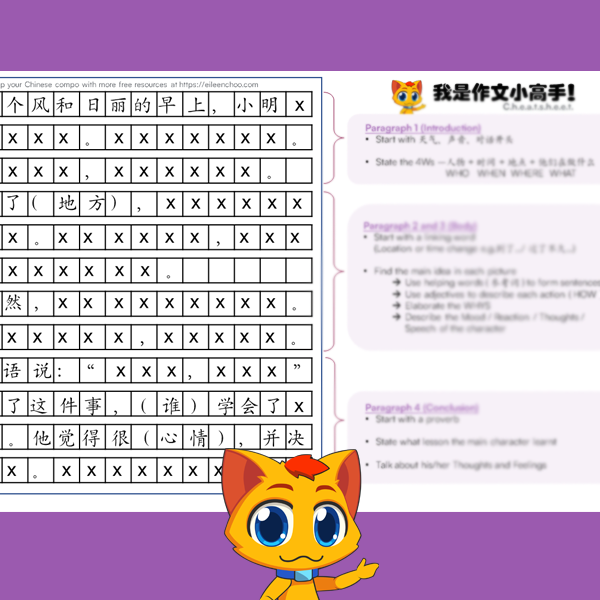
Recommended For You


Improve Chinese Essay Writing- A Complete How to Guide
- Last updated: June 6, 2019
- Learn Chinese
Writing can reflect a writer’s power of thought and language organization skills. It is critical to master Chinese writing if you want to take your Chinese to the next level. How to write good Chinese essays? The following six steps will improve Chinese essay writing:
Before You Learn to Improve Chinese Essay Writing
Before you can write a good essay in Chinese, you must first be accustomed with Chinese characters. Unlike English letters, Chinese characters are hieroglyphs, and the individual strokes are different from each other. It is important to be comfortable with writing Chinese characters in order to write essays well in Chinese. Make sure to use Chinese essay writing format properly. After that, you will be ready to improve Chinese essay writing.
Increase Your Chinese Words Vocabulary
With approximately 100,000 words in the Chinese language, you will need to learn several thousand words just to know the most common words used. It is essential to learn as many Chinese words as possible if you wish to be a good writer. How can you enlarge your vocabulary? Try to accumulate words by reading daily and monthly. Memory is also very necessary for expanding vocabulary. We should form a good habit of exercising and reciting as more as we can so that to enlarge vocabulary. Remember to use what you have learned when you write in Chinese so that you will continually be progressing in your language-learning efforts.
Acquire Grammar,Sentence Patterns and Function Words
In order to hone your Chinese writing skills , you must learn the grammar and sentence patterns. Grammar involves words, phrases, and the structure of the sentences you form. There are two different categories of Chinese words: functional and lexical. Chinese phrases can be categorized as subject-predicate phrases (SP), verb-object phrases (VO), and co-ordinate phrases (CO). Regarding sentence structure, each Chinese sentence includes predicate, object, subject, and adverbial attributes. In addition, function words play an important role in Chinese semantic understanding, so try to master the Chinese conjunction, such as conjunction、Adverbs、Preposition as much as you can. If you wish to become proficient at writing in Chinese, you must study all of the aspects of grammar mentioned in this section.
Keep a Diary Regularly to Note Down Chinese Words,Chinese Letters
Another thing that will aid you in becoming a better writer is keeping a journal in Chinese. Even if you are not interested in expanding your writing skills, you will find that it is beneficial for many day-to-day tasks, such as completing work reports or composing an email. Journaling on a regular basis will help you form the habit of writing, which will make it feel less like a chore. You may enjoy expressing yourself in various ways by writing; for instance, you might write poetry in your journal. On a more practical side of things, you might prefer to simply use your journal as a way to purposely build your vocabulary .
Persistence in Reading Everyday
In addition to expanding your view of the world and yourself, reading can help you improve your writing. Reading allows you to learn by example; if you read Chinese daily, you will find that it is easier to write in Chinese because you have a greater scope of what you can do with the vocabulary that you’ve learned. Choose one favorite Chinese reading , Read it for an hour or 2,000 words or so in length each day.
Whenever you come across words or phrases in your reading that you don’t understand, take the time to check them in your dictionary and solidify your understanding of them. In your notebook, write the new word or phrase and create an example sentence using that new addition to your vocabulary. If you are unsure how to use it in a sentence, you can simply copy the sample sentence in your dictionary.
Reviewing the new vocabulary word is a good way to improve your memory of it; do this often to become familiar with these new words. The content of reading can be very broad. It can be from novels, or newspapers, and it can be about subjects like economics or psychology. Remember you should read about things you are interested in. After a certain period of accumulation by reading, you will greatly improve your Chinese writing.
Do Essay Writing Exercise on a Variety of Subjects
As the saying goes, “practice makes perfect.” In order to improve your China Essay Writing , you should engage in a variety of writing exercises. For beginners, you should start with basic topics such as your favorite hobby, future plans, favorite vacation spot, or any other topic that you can write about without difficulty.
For example :《我的一天》( Wǒ de yì tiān, my whole day’s life ),《我喜欢的食物》( Wǒ xǐhuan de shíwù, my favorite food ),《一次难忘的旅行》( yí cì nánwàng de lǚxíng, an unforgettable trip ) etc.
Generally the writing topics can be classified into these categories: a recount of an incident,a description of something/someone, a letter, formulate your own opinion on an issue based on some quote or picture etc.
Takeaway to Improve Chinese Essay Writing
Keep an excel spreadsheet of 口语(Kǒuyǔ, spoken Chinese) –书面语(Shūmiànyǔ, written Chinese) pairs and quotes of sentences that you like. You should also be marking up books and articles that you read looking for new ways of expressing ideas. Using Chinese-Chinese dictionaries is really good for learning how to describe things in Chinese.

Online Chinese Tutors
- 1:1 online tutoring
- 100% native professional tutors
- For all levels
- Flexible schedule
- More effective
- Share on Facebook
- Share on LinkedIn
- Share via Email

Qin Chen focuses on teaching Chinese and language acquisition. She is willing to introduce more about Chinese learning ways and skills. Now, she is working as Mandarin teacher at All Mandarin .
You May Also Like

This Post Has 3 Comments
When I used the service of pro essay reviews, I was expecting to have the work which is completely error free and have best quality. I asked them to show me the working samples they have and also their term and condition. They provided me the best samples and i was ready to hire them for my work then.
This is fascinating article, thank you!
Thank you so much for sharing this type of content. That’s really useful for people who want to start learning chinese language. I hope that you will continue sharing your experience.
Leave a Reply Cancel reply
Your email address will not be published. Required fields are marked *
The Guide to Writing Your First Mandarin Essay
When you want to be able to make writing your first Mandarin essay nice and easy, it pays to put plenty of thought and effort into the preparation. As the old saying goes ‘fail to prepare, prepare to fail.’ To give you plenty of food for thought we’ve put together everything you need to know to get things moving. All you need to do is work through the following steps, and you’ll be submitting your essay in no time at all.
Check you understand the basics
There are so many things you have to think about when writing an essay, particularly when it’s not in your native language. But as with any cognitively demanding task, the process for getting started is always the same. Check you understand the following basics and you’ll be heading in the right direction:
- Do you know what the question means?
- Have you made a note of the final submission date?
- Make sure you read some past examples to get a feel for what’s expected of you
- Do you understand the question that has been set?
- Do you know who you can talk to if you need advice along the way?
- Are there any restrictions on the dialect you should be aware of?
Once you can write the answers to the above down on a single side of the paper, you are ready to tackle the main part of the problem: putting pen to paper.
Set aside time to write
The chances are that you’re not going to be able to pen the entire essay in a single sitting, and that’s okay. It’s nothing to be ashamed of or to worry about, and it’s natural that you need to work across multiple days when writing your first essay.
If you want to be able to make great progress, the most important thing is sticking to a routine. You need to have consistency in your application, and you need to be able to know when you are at your most productive. It’s no good staying up late one night and then carrying on early the next morning. You’d be far better off writing for the same amount of time but on two successive afternoons. Think about how your studies fit in with the rest of your daily life, and then choose the time that seems most appropriate. If you box it off and decide it’s only for writing, you’ll be in a great routine before you even know it.

Clear space so you can focus
As well as having time to write each day, you need a place to write too. The world is full of distractions (most of them are digital and social) so that means you’re going to want to keep yourself to yourself, and your phone in a different room. It might seem a little boring or uncomfortable at first, but you need to practice the habit of deep work. It’s what will allow you to create the most in the shortest time — ideal if you want to have plenty of time leftover to spend doing the other things that matter to you.
Have a daily word count in mind
Telling yourself that you want to write an essay today is one thing, but if you’re really going to push yourself to stick to your goal then you need to get quantitative. If you have a word count in mind that you need to hit, then it will prevent you from giving up and throwing in the towel the minute you start having to think and concentrate more than feels normal. Just like working out in the gym, it’s the temporary moments of extra effort that really drive the big differences. It’s when you’ll see the biggest improvement in your writing ability, and the lessons you teach yourself will stay with you for years to come. Ideal if you want to become a fluent Mandarin writer, as well as an engaging face-to-face speaker.
Read widely to provide context
When you’re immersed in an essay it can be all too easy to become blinkered and fail to pay attention to everything else that’s going on around you. Of course, you want to be focused on the task at hand, but you don’t want to be single-minded to the point of ignoring other great learning resources that are just a click away.
Reading widely is one of the best ways to improve your essay writing because it exposes you to techniques and approaches used by the best of the best. You’re not expected to be able to instantly write like a native speaker after an hour of reading. But what you will be able to do with consistent application is build up confidence and familiarity with written Mandarin. Over time this will reflect on the quality and depth of your writing as you gradually improve and take onboard lessons you’ve learned.
Take a break before you proofread
Last but not least, you need to remember that essay writing is a marathon, not a sprint. It’s all about taking the time to get things written before you hand them in, not racing through to try and finish on time. If you want to get the most out of your writing you need to take a day off between finishing your draft and proofing it. That way your brain will have had plenty of time to reflect on the work you’ve produced, and you’ll be able to spot many more little mistakes and places for improvement than you would if you proofed right away.
Final Thoughts
Writing Mandarin is a challenging task that will test your language skills and make you think hard about how to apply what you’ve learned so far. It might be slow going to begin with, but that’s great as it means you’re pushing your limits and building on your existing skills. If you want to be able to master Mandarin, you need to persevere and stay the course. Once you do, you’ll start to improve a lot faster than you expect.
By Diana Adjadj | A Super Chineasian
You may also like

Understanding the Three Philosophical Leaders Of The East

Chinese Tea, English Tea or Matcha? Learn Them All in Chinese!

Double the Fun: Ten Two-Syllable Chinese Homophones For Beginners
Tell your chineasy stories.

Subscribe to our Newsletter
Copyright © 2024 Chineasy. All rights reserved.

- Sections Sections Finance Business Tech Economy China World Editorial & Opinion Weekend Long Read Research & Analysis Lifestyle Books & Arts Blog Video Caixin Weekly Sneak Peek Topics Asia New Vision Forum War in Ukraine Evergrande Crisis ESG & Carbon Goals China-U.S. Rivalry Coronavirus Hobbled Huawei Digital Currency Fintech / Internet Finance Selected CX Daily Weekly Must-Read Energy Insider Economic Indexes Caixin Explains Reg Watch Subscriber Events ThinkChina The Wall Street Journal News Graphics
- Market Data
- Company Index
Weekend Long Read: What We Can Learn From This Year’s Gaokao Essay Topics

Weekend Long Read: ‘Lying Flat’ Is the New Resistance Movement to Materialism

Trending in China: Young Chinese Reject Rat Race, Embrace ‘Lying Flat’

We ‘ve added you to our subscriber list.

Participation of Indian Prime Minister Narendra Modi in the 5th Eastern Economic Forum Discussed in Moscow
Get exposure for your startup at RISE 2020
CreditEase’s Tang Ning: China’s Wealth Management Market is Undergoing Five Major Shifts
Meet 5 of the best startups selected to represent China at the largest technology event in Asia
Products & Services
Terms of Use
Media Partners

Copyright © 2021 Caixin Global Limited. All Rights Reserved.
- Remember me
- Forgot Password
- Don't have an account? Create one
- Photo Stories
News & Events
- Announcements
- Pitch to Us
- International
Latest Magazine

Latest Videos

Latest Podcasts

The TWOC Gaokao Essay Guide

- June 15, 2017
Photo Credit:
Our tips for the most mind-boggling prompts from this year’s essay tests.
As anyone with standardized-testing experience knows, one of the most frustrating sections in any exam is the essay-writing segment. Unlike a multiple-choice questions, there’s as it’s impossible to just guess the right answer based on your favorite letter from A to D.
The gaokao is no different in this respect and, with the exam period finally over , we take a look at some of the essay prompts offered in various regions and what we think they mean.
[ Editor’s note: The examiners’ approach varies widely from city to city. For example, Beijing offers two essay topics along with a detailed summary of different requirements. Shanghai simply offers a single topic, and a suggested word count. Our own suggested safe answers are merely that—suggestions—based on what previous years’ examinees have answered and online commentary by test prep experts. ]
Shanghai Gaokao Language Exam
Fortunetelling. Life is full of variables. Some are very happy to have their fortune told, others are not. Please write an essay that discusses your thoughts.
Requirements: Come up with your own title and write at least 800 words.
Safe answer: Take a stance on whether people should listen to predictions and forecasts, both on micro and macro levels.
Beijing Gaokao Language Exam
Write at least 700 words on one of the following two topics:
1) Regarding Bonds
This essay topic is more flexible, down to earth, can be related to family, society and ethnicity, ideas of a nation. There is much that can be written on this topic.
Bonds connect people and things. Public feeling requires the agglomeration of bonds, power requires bonds to act together. In today’s world, globalization, cultural exchange, historical inheritance, social stability, and harmonious campuses all require bonds. Please write an argumentative essay on the theme of “Regarding Bonds.”
Requirements: Take a clear position, make abundant use of evidence, arrive at reasonable argument.
2) My Country, I Take Photos for You
Our republic will celebrate its 100th birthday in 2049. Pretend that you will be tasked with taking pictures that demonstrate the great achievements in the revival of the Chinese civilization. What kind of images will you choose? Please be creative, and write a narrative essay on the theme of “My Country, I Take Photos for You.”
Requirements: Be plausible, have narrative and descriptive elements, can write about major themes or describe a small scene as metaphor for a larger theme.
Safe Answer: Regarding Bonds, emphasize the benefits of strong familial bonds, how this makes efficient members of society, and why this makes China great
Safe Answer: “My Country, I Take Photos for You” offers examples of China’s achievements, so discuss these. There are some moments that should not be illustrated and discussed, as they do not shine a positive light on China, even if they play an important role in the country’s history.
Tianjin Gaokao Language Exam
Please write an essay according to the following requirements:
We grow up surrounded by elders and think that we understand them. However, each elder is like a thick book. Once reopened, we discover their life truths, traditions, and the imprints of the generation. In turn, we find out more about ourselves, recognize their growth and maturity in our childhood, and realize our similarities and differences.
At the age of 18, we have grown up. When we reread [our elders] today, it is as adults that we converse with them and recognize their souls in rational encounter. Please combine analysis of your life experiences and write an essay around the theme of “Rereading the Book on Elders.”
Requirements: 1) Write from your own perspective, with your own title; 2) No style restrictions (except poems and songs), write in a distinctive style; 3) At least 800 words; 4) No plagiarism.
Safe Answer: Explain why listening and respecting elders is important, and how they have positively affected your growth. Examples of lessons learned and positive influences are a must.
Guangdong Gaokao Language Exam
Read the following passage and write the essay according to the requirements:
According to a survey of foreign students studying in China, the key words that they closely watching are: One Belt, One Road; pandas; square dancing; Chinese cuisine; the Great Wall; bike-sharing; Peking opera; air pollution; beautiful villages; food safety; high-speed rail; and mobile payments
Please choose two to three of the above key words that represent what you know about China, and write an essay to help young foreigners understand China. You are required to pick key words that are naturally connected. Pick an angle, write with a distinct style, choose your own title, and do not plagiarize. Must write more than 800 words.
Safe Answer: Please write a promotional piece to attract young foreigners to China by using key phrases that they know and would find appealing.
Sichuan Gaokao Language Paper
This year marks the 40th anniversary since gaokao was restored. In these years, gaokao has helped the country select its brightest minds, promote educational reform and social progress, and has had many other great achievements. These 40 years, the gaokao has inspired dreams, embodied the memories and emotions of many generations of students, and has seen countless families shed tears and sweat as well as their laughter and celebration.
Think back, the 1977 gaokao singled a turning point for a generation. Now today, you are together with millions of candidates, ready to take on the exam.
With either “My Views on Gaokao” or “My Gaokao” as your sub-heading, please write an essay. You are required to choose an angle and direction, write in a distinct style, and choose your own title. Do not plagiarize or write less than 800 words.
Safe Answer: Let us know how much you love the gaokao system, how it has shaped the great minds in the country, and why you were super excited for this exam period.
Try the gaokao English exam here .
Ethan Yun is a contributing writer at The World of Chinese.
Sponsored Ads

THE BEST OF THE WORLD OF CHINESE TO YOUR INBOX
We'll keep you updated with the latest and best content about chinese society, culture and travel., related articles.

Bottom of the Class: The Woes of China’s Liberal Arts Students
China’s liberal arts students still value their expertise in the face of poor employment prospects, low salaries, and societal pressure to switch to STEM subjects

30 Years of Choosing College Majors in China
How did Chinese students earn the right to choose their own majors, and how did the most popular choices evolve over time?

Last Lockdown: Why Are China’s Campuses Still Closed to the Public?
Months after “zero-Covid” policies disappeared around China, many colleges and universities still have yet to lift campus entry restrictions
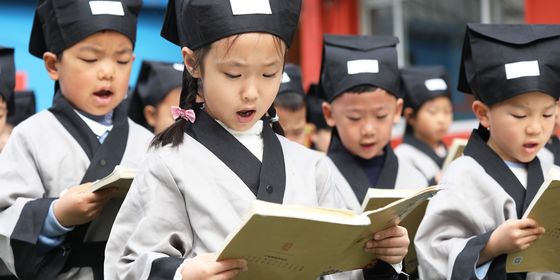
How Did Ancient Chinese Scholars Prepare for Exams?
From cram academies to meeting celebrity scholars, preparation for ancient China’s civil service exams was both similar and different to test-prep today

Scan to follow us on WeChat
Or add: Theworldofchinese

- Be a Member
- English French Chinese
- General Chinese learning tips
How to Write a Good Chinese Essay
Posted by Lilian Li 17816
For any kind of language, the essay is the most difficult thing to do in the exam. Generally speaking, writing articles is just to tell a story, after you make the story clear, the article also is finished. But it also different with speaking. A good article is like a art, is worth for people to appreciate, to taste. But how to accomplish such a good art? I think the most important thing is the three points: attitude, subject matter, emotional.
A good beginning is half done. For writing, material selection and design are not the start. The most important thing still is to adjust their mentality as well. When you decided to write, then dedicated yourself to write, not half-hearted, and your thinking nature won't be upset. Once the train of thought was interrupted, your speed will be slow and the point will be word count. So how can you write down a interesting article with a good quality? All in all, attitude is can decide the success or failure of the articles.
Subject is the biggest problem in our writing. It is from life, but not all people can observe life, experience life. The only point is to write the true things, maybe not so tortuous plots, but can write a really life. Moreover, when you get the subject, there are some tips for students to pay attention:
1. Make the topic request clear: The article should around the topic, pay attention to the demand of genre and number of words, some restrictive conditions and avoid distracting, digression.
2. Determine the center, choose the right material. To conform to the fact that a typical, novel, so it’s easy to attract the attention of people.
3. Make a good outline, determine the general, write enough words.
4. Sentence writing smooth, there is no wrong character, no wrong grammar in article.
Emotion, it is very important. If we compared an article to be a human. So emotion is his soul. Man is not vegetation, when they meet something, there must be personal thoughts and feelings. Sometimes it also tend to have their own original ideas. If you can put your own thoughts, feelings and insights into the article, then this article will be very individual.
Chinese essay is not just meaning some simple Chinese characters and make a simple sentences, it needs the Chinese grammar and sentence structure, if you don't familiar with Chinese grammar, you can learn our Chinese grammar course .
At last, adhere to write diary at ordinary times, it can practicing writing. Try to read some good articles, good words and good paragraphs with a good beginning and end. Learn to accumulate and draw lessons from them.
If you are interested in our Chinese grammar course, you can try our one online free trial , you will enjoy it.
About The Author
Related articles.

Free Trial

Self-test

Concat Us

Chat online

Share Us
Want to receive regular Chinese language tips & trivia?
Hacking Chinese
A better way of learning mandarin, 20 tips and tricks to improve your chinese writing ability.

Image from The Simpsons S13E4: A Hunka Hunka Burns in Love.
Writing is an important part of learning Chinese. The written word allows us to communicate online, record our thoughts and opinions and share them with others.
Writing is also an important part of many professional applications of learning Chinese, such as communication with colleagues, partners or clients. Finally, writing is also a part of many proficiency tests.
Writing in Chinese is different compared with most other languages in that there is a dual challenge learning both to write characters and to compose text. These are two completely different skills.
In this article, I will focus on composing text. For more about learning to write characters, please read this article: My best advice on how to learn Chinese characters .
My best advice on how to learn Chinese characters
Writing as a process rather than a product
Many students and teachers treat writing as a product, putting emphasis on the text itself. This effect is often enhanced by setting a grade on a writing assignment and then moving on to the next unit.
Writing is better viewed as a process, where what you write is just a milestone on your journey towards better writing ability. This usually means that you write fewer texts, but that you work more with each one. The goal is learning, after all, not writing a certain number of characters.
It should come as no surprise that I like writing; I have spent many thousands of hours writing in a foreign language (a lot of English, much Chinese and almost no French). Naturally, this website is in English, but isn’t called “Hacking English”, so I will focus on Chinese here. I have actually published a few articles in Chinese here as well, this one about using adventure text games being the most recent one . The advice in this article is based on my own experience with writing in foreign languages, as well as reading and research into second language writing.
I have divided the writing process into three phases:
- Before writing
- During writing
- After writing
How to improve your Chinese writing ability: Before writing
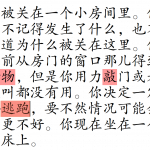
- Familiarise yourself with text type and genre – When reading, pay attention to the genre and how it works, A formal email, a shopping list and a doctoral dissertation are very different types of texts. A few questions to ask yourself are: What function does the text serve? Are there any formal characteristics of this type of text in Chinese? How is information organised in this type of text? The answers can be different in Chinese compared with your native language. For example, writing emails is very different in different languages when it comes to how to start, end and so on. Sometimes you can find information about this online as well, so it can be worth studying a bit. I actually asked a question about this on Stack Exchange back in 2012.
- Write about topics you care about – When choosing what to write, the most important consideration is what you want to communicate to others. Writing requires concentration and effort, which is harder to muster if you feel the task is boring or meaningless. We all like different things, so it’s hard to give general advice, but topics related to your own life, your experiences and opinions are good places to start. A journal or diary is great because it provides a never-ending sequence of events to write about! If you find it hard to come up with topics, here are some suggestions: 50 Questions That Will Free Your Mind , 49 ESL Writing Topics , the Book of Questions .
- Keep it on the write level – While you should write about things you care about, keep it realistic. As a rule of thumb, do not try to write about things you are not already reading about with some confidence and fluency. Don’t write about spaceflight if you’re not already comfortable reading about it in Chinese; stay away from writing fiction heavy on descriptions of places and events if you’re not reading such stories a already. I’ve done my fair share of writing beyond my level and it’s not worth it. You will spend many times longer on each text, but you don’t learn more. As I said before, writing is the result of learning, not the cause of it.
How to improve your Chinese writing ability: During writing
- Organise your thoughts by writing a simple outline – When it comes to writing clearly, much of the thought-process is the same no matter what language you’re writing in. It’s hard to write coherent and easy-to-read text even in your native language if you yourself only figure out what you want to say as you go along. Needless to say, it’s even harder in a foreign language! Write a simple outline before you start. This can be a handful of bullet points.
- Write a full draft, then polish – Inexperienced writers often get stuck in details immediately. What should the title be? How should it be worded? Does A make a better title than B? These things will emerge later. Instead of focusing on details from the start, write a draft first. This version is probably quite bad, relatively speaking, but fortunately, you don’t need to show this to anyone! Once you have a draft, you can go through the text again and take care of those details you skipped earlier. Choosing a title is easier after you have a draft, for example. Now that you know what the whole text is like in general, it will be much easier to work with and you also don’t feel stupid after spending one hour and having only written two sentences.

- Don’t make your text more complicated than you have to – Some students (including my past self) try to write more advanced Chinese than they can handle, thinking that throwing in more advanced words will impress people ( chengyu is a good example of this ). This almost never works and is generally a bad idea. Your goal should be to use to write as clearly as possible, using language you already know. This is also what the receiver will care about. Even on a proficiency exam, using difficult words just for the sake of it will not raise your score, especially if you use them incorrectly. Advanced readers are also very sensitive to uneven writing, so if your level is at the lower-intermediate, occasionally throwing in very hard words will just show that you used a dictionary and don’t really know what you’re doing. Teachers of all languages can testify to how easy it is to see through this, even if students (especially kids) are baffled by how easy the teacher can tell.
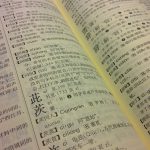
- Use double translation if you want to be sure you’ve found the right word – This is when you look up a word in Chinese, then feed the result back to the dictionary and translate back to your native language. If the result seems reasonable, it’s probably the word you’re looking for. Let’s say you want to translate “beam”, as in “beam of light”. You look it up and get 横梁. You put it in your text and causes great confusion, some amusement and a bit of frustration for your Chinese teacher. If you had translated it back to English, you would have seen that 横梁 means “beam; transom; crossgirder; girder” .

How to improve your Chinese writing ability: After writing

Towards better writing ability in Chinese
This article contains tips and tricks I have collected over my 20+ years of writing in a foreign language. These are insights I wish I would have come to earlier, but that I hope will help you on your quest for better writing ability in Chinese.
This is also the advice that I give to students in the university courses I teach that focus on writing, all collected in one place with easy references to further reading. I realise that there’s more here than most of you probably bargained for, but as should be clear by now, I not only love to write, I also love writing about writing!
What’s your best tips for writing in a foreign language? Do you have any other tips beyond what I mention here? What advice would you offer other people who have just started writing in Chinese? Leave a comment below!
Editor’s note: This article was written in February 2021 and replaces several old articles with partially overlapping content. Comments from these other articles have been moved here.

12 comments
I can have great joy writing in whatever language. The issue is normally to sit down and do it.
I agree that it’s best to write about what you care about, but have once fallen in the trap of writing about something that I cared about too much for an English exam. The structure of my story came apart from wanting to but too much into the article.
If you want to say a lot about a certain topic but can’t due your level of the language, it can be frustrating.
I’m currently on a roll with my Lang-8 entries about San Francisco/California botany. It’s very easy to get specific (I can talk about one species of plant per entry), and some people seem to be interested in the topic, especially since it’s very easy for me to add personal touches (for example, when I talked about lupines, I uploaded some photos my father took of the lupines growing in my family’s backyard). I could make many, many entries about this topic (for example, I might make a follow-up entry about the lupines explaining WHY they are in the backyard).
Sounds great! Seems like an inexhaustible source of topics. I was on a roll with more than one entry per day for a while, but then… I stopped. I’ve been doing other things, but writing sentences now and then should be possible.
- Pingback: Whizz Learning | Start reading and writing Chinese as quickly and painlessly as possible!
If you asked me what is one of the tedious and frustrating things about Chinese, I would say it’s how some words (but not all) can act as verbs, adjectives AND nouns, and how any given dictionary would fail to mention this or give examples of its different uses.
Take the word 轰动 for example.
My ABC dictionary says it’s an adjective (stative verb) but then goes on to define it as: “cause a sensation; make a stir”.
My PlC dictionary gives these two examples: 轰动全国 — cause a sensation throughout the country 全场轰动 — make a stir in the audience (or in the hall) Hmm…I wonder why the position of 轰动 is switched in both of these very similar constructions?
CC dictionary says it means “to cause a sensation”.
Finally, my ADS dictionary, says it’s a Noun and means “sensation”.
Now, accepting for a moment that 轰动 can be all three (verb, adjective, and noun), why doesn’t each dictionary state this simple fact?
–Daniel
Chinese, like English, often allows the grammatical identify to be defined by context. And in other cases, we add a suffix to mark a change in grammatical function.
In English, nouns, verbs, adjectives, and adverbs do use suffices to migrate a root word and in some cases to clarify role (which seems to originate from Latin).
A noun such as ‘work’ is also the verb ‘work’, whereas ‘working’ or ‘worked’ can be adjectives. And a verb such as ‘do’ can become a noun infinite ‘to do’ or noun gerund ‘doing’
All those suffix shifts are extremely difficult to the Chinese learner of English. Being able to not bother with them may actually be an eventual blessing.
There are words in Chinese that tend to be strictly one function — mostly conjunctions and prepositions.
I heartily agree with all of these tips (even as I admit that I sometimes stray from them myself out of frustration or because I’m pressed for time).
I try to cultivate curiosity about connotations and Chinese vocabulary, and let myself get sucked into Wikipedia, so that I can get myself into good habits. I find Wikipedia an excellent source both for the types of words which are often not in dictionaries, examples of words being used in context, and more detailed explainations of a word than most dictionaries provide.
It’s also exciting on the rare occasion I find a Chinese word/phrase/chengyu which describes exactly what the original writer expresses in English, but more concisely and elegantly.
Regarding #4, I tend to do a lot of double translation to verify both meaning and usage. Relying solely on translation from Chinese to English without verification by going from English to Chinese can lead to technically correct translation that is still a bit odd.
In any event, the need to spend so much time with dictionaries can be a bit tedious and daunting, and a struggle at first. But it is well worth it.
Feels a bit weird to respond to your comment six years later, but I have now updated the article and included double translation as well! It’s something I often recommend students doing and I should of course have mentioned it in the old article as well. Thanks for reminding me about it, even if it took me many years to actually do something about it! 🙂
- Pingback: 12 topics to kickstart your Vietnamese writing - More Vietnamese
Olle, how do you feel about intermediate/advanced learners writing their outlines or drafts in their native language and then moving to Chinese? Is there research that suggests when this is/isn’t helpful, or when it might be time to move on from this habit, and how?
I doubt there is direct research that can conclusively answer this question, but I see no problem with writing an outline in one’s native language. We’re talking about few words that aren’t going to influence sentence structure or word choice once you get down to actually writing the text. If it’s easier to arrive at a clear structure by doing so in your native language, then do that!
Leave a comment Cancel reply
Your email address will not be published. Required fields are marked *
This site uses Akismet to reduce spam. Learn how your comment data is processed .
Privacy Overview

31 short writing prompts for Mandarin Chinese (as written by ChatGPT)
A full month of writing prompts with target words provided.

I thought I’d send this out in case anybody else could find it useful.
This is Steven's Language Vlog Newsletter! Subscribe for free to receive language learning tips and articles straight to your inbox! :D
ChatGPT is all the rage these days (though the newest version ChatGPT4 is already here) and so I thought I’d ask it some questions that would be relevant to my own language studies. It didn’t disappoint.
I’m not sure where this thing ripped these ideas off from, or if they’re just so generic that even a monkey could write them up, but I thought it was good enough for what my purpose is.
The idea is to use a specific set of words each day to complete a writing prompt much like one of the tasks in the HSK 5 writing section. However, the HSK 5 test only gives five words and asks you to write a short paragraph between 80 and 100 characters long whereas this list provides a thematic prompt and along with five words from the HSK 5 list.
And although my original intention was to write these prompts out by hand, I’ve found that it’s sometimes easier to write things out on computer because I’m right there and don’t need to find my notebook. Either way, spending 10-15 minutes a day to write out a prompt is a good way to practice up those grammar constructions and familiarity with actually choosing the correct characters from the choices given when using pinyin input.
Without further adieu, here is the list:
Describe your morning routine using the words 早晨 (zǎochén) - morning, 身体 (shēntǐ) - body, 洗漱 (xǐshù) - to wash up, 早餐 (zǎocān) - breakfast, 准备 (zhǔnbèi) - to prepare.
Write about a time when you felt confident and use the words 自信 (zìxìn) - confidence, 成功 (chénggōng) - success, 实现 (shíxiàn) - to realize, 能力 (nénglì) - ability, 勇气 (yǒngqì) - courage.
Write about your favorite music and use the words 音乐 (yīnyuè) - music, 节奏 (jiézòu) - rhythm, 歌词 (gēcí) - lyrics, 旋律 (xuánlǜ) - melody, 曲风 (qūfēng) - style.
Write about a place you have visited and use the words 景色 (jǐngsè) - scenery, 游览 (yóulǎn) - to tour, 古老 (gǔlǎo) - ancient, 历史 (lìshǐ) - history, 文化 (wénhuà) - culture.
Write about your favorite food and use the words 美食 (měishí) - delicious food, 口味 (kǒuwèi) - taste, 食材 (shícái) - ingredients, 烹饪 (pēngrèn) - cooking, 餐桌 (cānzhuō) - dining table.
Write about a goal you have and use the words 目标 (mùbiāo) - goal, 计划 (jìhuà) - plan, 执行 (zhíxíng) - to execute, 进步 (jìnbù) - progress, 成就 (chéngjiù) - achievement.
Write about your favorite hobby and use the words 爱好 (àihào) - hobby, 兴趣 (xìngqù) - interest, 技能 (jìnéng) - skill, 艺术 (yìshù) - art, 创作 (chuàngzuò) - creation.
Write about a time when you had to make a difficult decision and use the words 决定 (juédìng) - decision, 选择 (xuǎnzé) - to choose, 考虑 (kǎolǜ) - to consider, 犹豫 (yóuyù) - to hesitate, 后悔 (hòuhuǐ) - regret.
Write about a memorable conversation you had and use the words 对话 (duìhuà) - dialogue, 讨论 (tǎolùn) - to discuss, 观点 (guāndiǎn) - viewpoint, 沟通 (gōutōng) - communication, 理解 (lǐjiě) - understanding.
Write about your favorite season and use the words 季节 (jìjié) - season, 天气 (tiānqì) - weather, 温度 (wēndù) - temperature, 风景 (fēngjǐng) - scenery, 空气 (kōngqì) - air quality.
Write about a person you admire and use the words 钦佩 (qīnpèi) - to admire, 成就 (chéngjiù) - achievement, 贡献 (gòngxiàn) - contribution, 坚持 (jiānchí) - to persevere, 信念 (xìnniàn) - belief.
Write about a time when you overcame a challenge and use the words 挑战 (tiǎozhàn) - challenge, 克服 (kèfú) - to overcome, 困难 (kùnnan) - difficulty, 坚强 (jiānqiáng) - strong, 勇气 (yǒngqì) - courage.
Write about your dream job and use the words 梦想 (mèngxiǎng) - dream, 职业 (zhíyè) - profession, 工作 (gōngzuò) - work, 发展 (fāzhǎn) - development, 成长 (chéngzhǎng) - growth.
Write about a person who has influenced you and use the words 影响 (yǐngxiǎng) - influence, 印象 (yìnxiàng) - impression, 指导 (zhǐdǎo) - to guide, 感悟 (gǎnwù) - realization, 教育 (jiàoyù) - education.
Write about your favorite book or movie and use the words 读物 (dúwù) - reading material, 电影 (diànyǐng) - movie, 情节 (qíngjié) - plot, 主题 (zhǔtí) - theme, 角色 (juésè) - character.
Write about a time when you felt proud and use the words 自豪 (zìháo) - proud, 成就 (chéngjiù) - achievement, 功绩 (gōngjì) - accomplishment, 重要 (zhòngyào) - important, 贡献 (gòngxiàn) - contribution.
Write about your favorite travel destination and use the words 旅游 (lǚyóu) - travel, 目的地 (mùdìdì) - destination, 风俗 (fēngsú) - customs, 文化 (wénhuà) - culture, 体验 (tǐyàn) - experience.
Write about a time when you felt grateful and use the words 感恩 (gǎn'ēn) - gratitude, 感谢 (gǎnxiè) - to thank, 珍惜 (zhēnxī) - to cherish, 幸福 (xìngfú) - happiness, 家庭 (jiātíng)
Write about your favorite hobby and use the words 爱好 (àihào) - hobby, 技能 (jìnéng) - skill, 创意 (chuàngyì) - creativity, 放松 (fàngsōng) - relaxation, 热爱 (rè'ài) - passion.
Write about a time when you had to make a difficult decision and use the words 决定 (juédìng) - decision, 选择 (xuǎnzé) - choice, 抉择 (juézé) - to choose, 做出决策 (zuòchūjuécè) - to make a decision, 感到犹豫 (gǎndàoyóuyù) - to feel hesitant.
Write about a childhood memory and use the words 童年 (tóngnián) - childhood, 回忆 (huíyì) - memory, 玩具 (wánjù) - toy, 活泼 (huópō) - lively, 纯真 (chúnzhēn) - innocent.
Write about a current event and use the words 时事 (shíshì) - current events, 新闻 (xīnwén) - news, 社会 (shèhuì) - society, 政治 (zhèngzhì) - politics, 经济 (jīngjì) - economy.
Write about your favorite food and use the words 食物 (shíwù) - food, 烹饪 (pēngrèn) - cooking, 味道 (wèidào) - taste, 餐桌 (cānzhuō) - dining table, 健康 (jiànkāng) - health.
Write about a memorable trip and use the words 旅行 (lǚxíng) - trip, 经历 (jīnglì) - experience, 风景 (fēngjǐng) - scenery, 交流 (jiāoliú) - communication, 冒险 (màoxiǎn) - adventure.
Write about a person you miss and use the words 怀念 (huáiniàn) - to miss, 想念 (xiǎngniàn) - to long for, 熟悉 (shúxī) - familiar, 回忆 (huíyì) - memory, 分别 (fēnbié) - separation.
Write about a goal you have and use the words 目标 (mùbiāo) - goal, 计划 (jìhuà) - plan, 实现 (shíxiàn) - to achieve, 进步 (jìnbù) - progress, 成功 (chénggōng) - success.
Write about your daily routine and use the words 日常 (rìcháng) - daily, 生活 (shēnghuó) - life, 工作 (gōngzuò) - work, 休息 (xiūxi) - rest, 健康 (jiànkāng) - health.
Write about a time when you helped someone and use the words 帮助 (bāngzhù) - to help, 支持 (zhīchí) - to support, 关心 (guānxīn) - to care, 合作 (hézuò) - to cooperate, 爱心 (àixīn) - love and care.
Write about a memorable achievement and use the words 成就 (chéngjiù) - achievement, 进步 (jìnbù) - progress, 努力 (nǔlì) - effort, 挑战 (tiǎozhàn) - challenge, 感动 (gǎndòng) - moved.
Write about a famous person you admire and use the words 崇拜 (chóngbài) - to admire, 成功 (chénggōng) - success, 才华 (cáihuá) - talent, 勇气 (yǒngqì) - courage, 影响 (yǐngxiǎng) - influence.
Write about a time when you faced a difficult situation and use the words 困难 (kùnnán) - difficulty, 挑战 (tiǎozhàn) - challenge, 克服 (kèfú) - to overcome, 勇气 (yǒngqì) - courage, 坚持 (jiānchí) - persistence.
I hope that helps!
Let me know if there’s anything else I can help out with.
Thanks for reading Steven's Language Vlog Newsletter! Subscribe for free to receive new posts and support my work.
Ready for more?
%20(1).png)
Ms Chen's 2024 Model Chinese Compo Pack
Learn the best composition techniques, tips and samples from ms chen , help your child gain a headstart and an advantage in chinese compositions.
The Situation
Secondary School Composition Format
There are 3 types of composition questions for O Level Higher Chinese Language / Chinese Language Paper 1.
Narrative (记叙文) - Covered in Sec 1 & 2
Argumentative (议论文) - Covered from Sec 2 onwards or Speech (演讲词) - Covered in Sec 4 and only for HCL
News-based (材料作文) - Covered from Sec 3 onwards
The Problem
The model composition books in the market are too ‘simple’ and do not cater to Higher Chinese students
Many schools encourage students to write Argumentative / News-based (材料作文)during exams
However, many students do not read the news or remember enough evidence (论据) to ace their composition
How you can inspire your child and help him / her improve their Chinese Compositions?
Ms Chen is here to help
Ms Chen's Model Chinese Composition Pack
By subscribing to Ms Chen's Model Composition Pack, you get access to model compositions with topics that are geared towards the latest news and spotted topics for O Level and school exams.
Ms Chen’s past and current students have benefitted from these spotted essay topics.
All the composition topics are from past year top schools' exam papers and O Level exam topics.
Clear annotation and explanation in model compositions to highlight best practices and techniques.
Check-in with Ms Chen if you have any questions.
Model Chinese Compositions (Secondary)
Preview by clicking the buttons
Model Chinese Compositions (Primary)
Preview by clicking the buttons

" 我在考试之前想要复习范文却找不到,无意中发现了陈老师的范文配套。感谢陈老师的范文,涵盖了多方面的话题,包括在O水准的材料文话题,在我准备O水准会考的过程中提供大大的帮助。"
王丹莹,新加坡女子中学 (中四, 2020), the packages.
Ace your Compo
20 Model Compositions (Jan-Oct 2024)
2 Model Compositions sent every first Wednesday of the month (For 10 months)
Narrative + Argumentative (Suitable for Sec 1 and Sec 2 HCL students)
Fee: Contact us to find out
40 Model Compositions (Jan-Oct 2024)
4 Model Compositions sent every first Wednesday of the month (For 10 months)
Narrative + Argumentative + Speech + News-based (Suitable for Sec 3 and Sec 4 HCL/CL students, lower sec students who wish to have a head start in news-based composition)
Primary School Package
4 Model Compositions sent every last Wednesday of the month (For 10 months)
4 Compo Types - 看图作文, 命题作文 (普华), 情境作文, 完成文章 (高华).
Who is it suitable for?
Primary School students taking PSLE
Secondary School students taking Higher Chinese Language
Secondary School students taking Chinese Language and would like to stretch your Composition skills and knowledge
Mode of payment for Ms Chen's Model Composition Pack is via bank / Paynow transfer.
1) Bank transfer (FAST): UOB 456-345-3375 OR
2) Paynow to Mobile: +65 91558311
By subscribing to Ms Chen's Model Composition Pack, you consent and agree to the Terms and Conditions .
Once you have made the bank / Paynow transfer, kindly drop a note to [email protected] or text 91558311 with the following details:
Package Subscribed (Package A / Package B / Primary School)
Amount Transferred
Date of Transfer
Email address to receive the Model Composition Pack
Your payment will be verified in the next 24 hours. Once verified, you will receive a successful enrolment notification.
If you subscribe in the middle of the year once the publications have started (e.g. May 2024), you will have access to all model compositions published from the start of the same calendar year, i.e. Jan to May 2024.
For enquiries, please reach out to Ms Chen using this form .
Subscribe Now
Chinese writing buddy.
If you need more guide and practice after reading Miss Chen's Model Compositions, but do not have the time to attend Ms Chen's classes, then the Chinese Writing Buddy Program is for you!

The Step-By-Step Guide To Write A Good Chinese Composition: Picture Composition For Higher Primary

Before getting down to a Chinese composition, the student needs to learn what makes it excellent—knowing how the questions work lets you cope with them efficiently.
Before we get into the step-by-step process of writing a tip-top Chinese Picture Composition, here’s a brief of you should know.
For a Picture Composition, there will be six pictures provided in the question. The first five depicts the beginning and climax of an incident, while the last image shows a question mark which requires students to plan and write a logical conclusion to the story.
Related: 8 Tips To Improve Chinese Composition In Primary School
The writing process
Try the following four-step process to write a piece of Chinese composition that’s up to the mark (and feel free to apply it to subsequent ones).
Step #1 Read the instructions carefully
Ah, the sweet, age-old advice. It’s a rule that seems so simple, but yet so hard to fulfil. Students often rush in exams when they get nervous. Teach your kid not to rush when they’re reading the instructions such as the minimum number of characters required. Also, the reference terms and phrases are great for setting the direction of the story context if students are at a loss.

Step #2 Observe the details of the pictures
While reading, it’s unimaginable how one can miss out on specific facts and details. Highlight keywords and/or phrases—anything that comes off as brow-raising or notable, or questionable—as well as making mental notes. Digression from the topic can cost huge marks, and this first step will ensure that pupils don’t get sidetracked. But, it’s wise not to spend too much time on this step as incompletion of work costs marks too! Also, the observation doesn’t end here. Train your child to interpret their observations. Carefully think about what these observations add up to—this will make step #4 easier.
Step #3 Think and decide on the prologue
Simply put, the prologue is the image before the first image. A preface is like a starter. It opens up the patron’s, in this case, the reader’s, appetite and provides a hint of what’s to come. Exceptionally accurate for picture composition, it’s implausible to create a story with rationale and reasoning by simply narrating what’s shown. A well-thought-out prologue gives necessary information on why the scenario in the pictures or the passage happened , helping readers understand the story better.
Related: 7 Expert-Approved Primary School Chinese Composition Writing Examples
Step #4 Think about the 5ws and 1h (or list them if there’s time)
There’s nothing worse than being caught in a jumble of messed-up thoughts. The 5ws and 1h—the final step in getting the skeleton of the composition secured—gives your little one a clear guideline of how the story should unfold, from the introduction to the passage, climax and the conclusion.

A simple guide to improving primary school composition
Students from primary three onwards will start to write compositions. The initial stages could be confusing, strange and discouraging. For parents to guide students through the writing process, take note of the following:
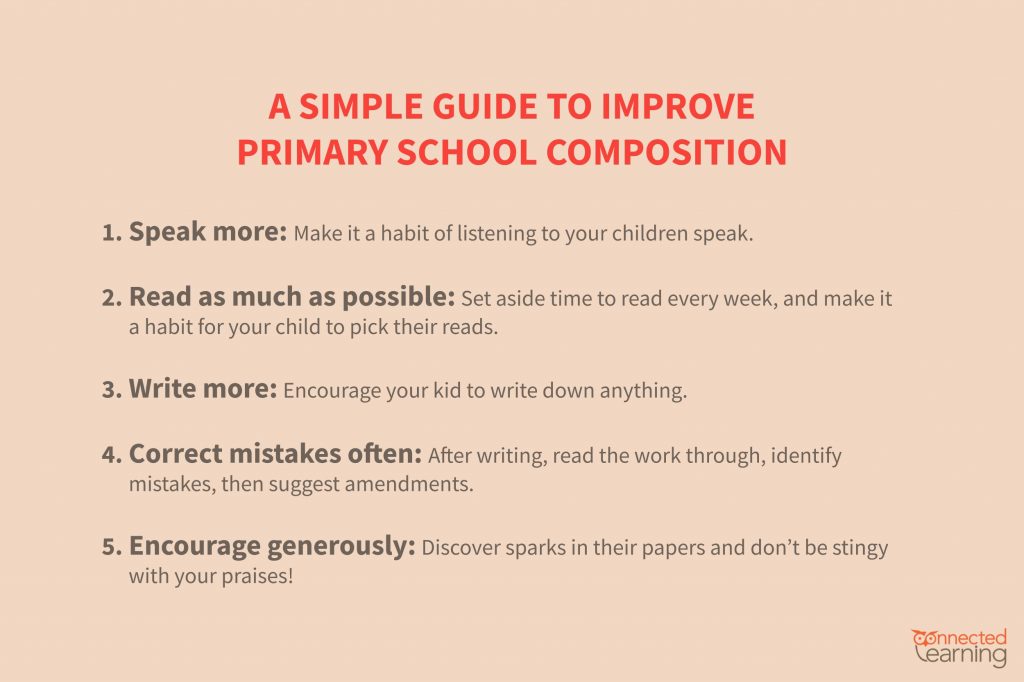
1. Speak more
“Speaking” means expressing what you see, hear, and think in words. Make it a habit of listening to your children speak. They can introduce people, things, natural scenery or hobbies, etc. Here’s a good activity: Hear them out for roughly 3 minutes and rearrange thoughts at certain parts where they seemed confused.
2. Read as much as possible
There’s a reason why reading has such a huge buzz. The novelist Stephen King once said, ‘If you don’t have the time to read, you don’t have the tools to write’. Set aside time to read every week, and make it a habit for your child to pick their reads.
3. Write more
Writing materials come from daily lives; things that you can see and hear. Encourage your kid to write down anything , be it a scene from a movie, or a piece of exciting news.
4. Correct mistakes often
The greatest teacher your kid will ever have is ‘mistakes ’. After writing, read the work through, identify mistakes, then suggest amendments. Refrain from reprimanding mistakes. Instead, have genuine discussions or conversations with your child about these blunders. This little move can strengthen their comfort level at making mistakes and encourage them to face errors at ease in future.
5. Encourage generously
Not every piece of your child’s work will be spectacular. But there’s always something interesting in their writings. Anything counts; it could be great sentences, the emotions portrayed, concise train of thought, etc. Discover sparks in their papers and don’t be stingy with your praises!
Related: 8 Tips To Improve Chinese Composition In Primary School
As we mentioned, reading holds an unquestionably crucial part to improve writing, and it’s sensible to read religiously. Take 15 minutes each day to read extracurricular books. To make the most out of these minutes, jot down uncommon words, sentences, and your comments.
Kids having trouble learning, remembering and using new Chinese idioms, terms and phrases? Our tutors are trained to engage students in the lessons where they’ll be able to pick up new knowledge, and eventually produce promising and sophisticated pieces of writing in time to come. Hurry and sign up for a free trial lesson now!

Liked this? Share it now!
Related posts.

How to Strengthen Chinese for K2 Children

Primary School Chinese Writing: Narrative Composition

Excelling in Chinese Oral PSLE: Expectations vs Reality
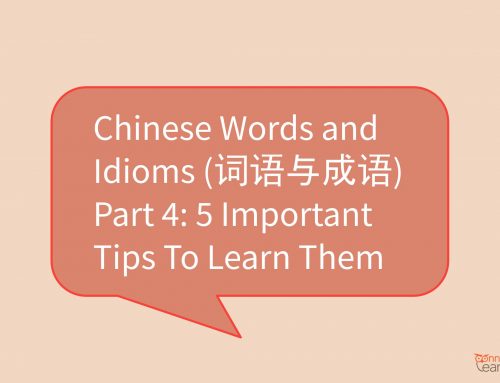
Chinese Words and Idioms (词语与成语) Part 4: 5 Important Tips To Learn Them

Learn Chinese Effortlessly: Extensive List of Chinese Idioms (词语与成语) Part 2
American Born Chinese

73 pages • 2 hours read
A modern alternative to SparkNotes and CliffsNotes, SuperSummary offers high-quality Study Guides with detailed chapter summaries and analysis of major themes, characters, and more. For select classroom titles, we also provide Teaching Guides with discussion and quiz questions to prompt student engagement.
Chapter Summaries & Analyses
Sections 1-3
Sections 4-6
Sections 7-9
Character Analysis
Symbols & Motifs
Important Quotes
Essay Topics
A bildungsroman is a work of literature that traces a protagonist as he, she, or they come of age. In what ways does American Born Chinese meet the definition of a bildungsroman?
The author’s use of American colloquialisms contrasts with the formal speaking manner of Tze-Yo-Tzuh , the creator of the universe. How does language help develop the characterization of different individuals in the novel?
Select three Asian stereotypes embodied by the character of Chin-Kee and break down the offensive nature of each one in detail. Explain why each stereotype is damaging to people of Asian heritage using evidence from the novel to support your response.

Don't Miss Out!
Access Study Guide Now
Related Titles
By Gene Luen Yang

Dragon Hoops
Gene Luen Yang
Featured Collections
Allegories of Modern Life
View Collection
Asian American & Pacific Islander...
Asian History
Books About Race in America
Chinese Studies
Coming-of-Age Journeys
Graphic Novels & Books
Immigrants & Refugees
New York Times Best Sellers
Required Reading Lists
SuperSummary Staff Picks
YA & Middle-Grade Books on Bullying
The Ingenious Legacy of Ancient Chinese Innovations
This essay about ancient Chinese inventions details the remarkable technological advancements made by China that have profoundly influenced the modern world. It discusses the creation of paper by Cai Lun, which revolutionized knowledge sharing and increased literacy. The compass, initially used for Feng Shui and later for navigation, transformed maritime exploration by allowing sailors to find their direction in all conditions. Gunpowder, discovered during the Tang dynasty, reshaped warfare globally, introducing firearms and cannons that shifted the course of history. Additionally, the development of printing technology, from woodblock to movable type, democratized information and spurred intellectual growth worldwide. The essay emphasizes how these inventions not only served practical purposes but also carried cultural significance, showcasing the innovative spirit of ancient China and its lasting impact on global technology and culture.
How it works
Given the abundance of technologies that have affected the present world in ways that we frequently take for granted, ancient China stands as a magnificent light in the history of human inventiveness. These discoveries not only transformed the traditional Chinese way of life but also cleared the path for global technology breakthroughs.
Paper is among the most amazing creations from ancient China. When paper was created by Cai Lun in the Han dynasty, in 105 AD, it played a crucial role in the dissemination of knowledge and literature.
Information was recorded on laborious and costly silk or bamboo strips before there was paper. With the invention of paper, writing became convenient and accessible, which encouraged a rise in literacy and the preservation of knowledge. Its importance is tremendous since it created a medium that later made books and ideas possible to spread, paving the way for further intellectual revolutions.
The Qin dynasty’s discovery of the compass was equally revolutionary. The compass was first developed for Feng Shui and divination, but during the Song dynasty, navigation became its primary use. This modest, inconspicuous gadget allowed sailors to find their route even on overcast days or dark, starless nights, revolutionizing nautical exploration. The compass had an influence that extended well beyond China’s boundaries, enabling the age of exploration and bridging continents via trade and cross-cultural interactions.
Gunpowder, another monumental Chinese invention, originated during the 9th century Tang dynasty. Initially discovered by alchemists seeking the elixir of life, gunpowder fundamentally changed warfare worldwide. It was first used in fireworks and gradually adapted for military purposes, leading to the development of cannons and guns. This explosive invention not only altered the dynamics of battlefields but also had profound impacts on the political and social structures of many societies, setting off changes that would eventually mold modern nation-states.
In addition to these well-known innovations, ancient China was also home to the invention of printing technology. The development of woodblock printing during the Tang dynasty, and later movable type during the Song dynasty, was crucial for mass communication. This technology enabled the widespread distribution of literature, governmental decrees, and knowledge, democratizing information in a way that was unprecedented. The printing press laid the groundwork for the Renaissance in Europe and the eventual spread of printed media across the world.
These inventions are just the tip of the iceberg when it comes to ancient China’s contributions to global technology and culture. From the development of silk production to the intricate art of porcelain manufacture, the ancient Chinese left an indelible mark on the world. Each invention not only served practical purposes but also carried deep cultural significance, reflecting the innovative spirit and the forward-thinking nature of the Chinese civilizations of the past.
As we reflect on these contributions, it becomes clear that the legacy of ancient China’s inventions is not merely in the objects themselves but in the enduring influence they have on our everyday lives. They remind us of the interconnectedness of human progress and the timeless nature of innovation. The story of these inventions is not just a chapter in the history of ancient China; it’s a foundational narrative in the history of the world, highlighting a collective human journey marked by curiosity, ingenuity, and the relentless pursuit of progress.
Cite this page
The Ingenious Legacy of Ancient Chinese Innovations. (2024, May 12). Retrieved from https://papersowl.com/examples/the-ingenious-legacy-of-ancient-chinese-innovations/
"The Ingenious Legacy of Ancient Chinese Innovations." PapersOwl.com , 12 May 2024, https://papersowl.com/examples/the-ingenious-legacy-of-ancient-chinese-innovations/
PapersOwl.com. (2024). The Ingenious Legacy of Ancient Chinese Innovations . [Online]. Available at: https://papersowl.com/examples/the-ingenious-legacy-of-ancient-chinese-innovations/ [Accessed: 17 May. 2024]
"The Ingenious Legacy of Ancient Chinese Innovations." PapersOwl.com, May 12, 2024. Accessed May 17, 2024. https://papersowl.com/examples/the-ingenious-legacy-of-ancient-chinese-innovations/
"The Ingenious Legacy of Ancient Chinese Innovations," PapersOwl.com , 12-May-2024. [Online]. Available: https://papersowl.com/examples/the-ingenious-legacy-of-ancient-chinese-innovations/. [Accessed: 17-May-2024]
PapersOwl.com. (2024). The Ingenious Legacy of Ancient Chinese Innovations . [Online]. Available at: https://papersowl.com/examples/the-ingenious-legacy-of-ancient-chinese-innovations/ [Accessed: 17-May-2024]
Don't let plagiarism ruin your grade
Hire a writer to get a unique paper crafted to your needs.

Our writers will help you fix any mistakes and get an A+!
Please check your inbox.
You can order an original essay written according to your instructions.
Trusted by over 1 million students worldwide
1. Tell Us Your Requirements
2. Pick your perfect writer
3. Get Your Paper and Pay
Hi! I'm Amy, your personal assistant!
Don't know where to start? Give me your paper requirements and I connect you to an academic expert.
short deadlines
100% Plagiarism-Free
Certified writers
- Student Opportunities
About Hoover
Located on the campus of Stanford University and in Washington, DC, the Hoover Institution is the nation’s preeminent research center dedicated to generating policy ideas that promote economic prosperity, national security, and democratic governance.
- The Hoover Story
- Hoover Timeline & History
- Mission Statement
- Vision of the Institution Today
- Key Focus Areas
- About our Fellows
- Research Programs
- Annual Reports
- Hoover in DC
- Fellowship Opportunities
- Visit Hoover
- David and Joan Traitel Building & Rental Information
- Newsletter Subscriptions
- Connect With Us
Hoover scholars form the Institution’s core and create breakthrough ideas aligned with our mission and ideals. What sets Hoover apart from all other policy organizations is its status as a center of scholarly excellence, its locus as a forum of scholarly discussion of public policy, and its ability to bring the conclusions of this scholarship to a public audience.
- Scott Atlas
- Thomas Sargent
- Stephen Kotkin
- Michael McConnell
- Morris P. Fiorina
- John F. Cogan
- China's Global Sharp Power Project
- Economic Policy Group
- History Working Group
- Hoover Education Success Initiative
- National Security Task Force
- National Security, Technology & Law Working Group
- Middle East and the Islamic World Working Group
- Military History/Contemporary Conflict Working Group
- Renewing Indigenous Economies Project
- State & Local Governance
- Strengthening US-India Relations
- Technology, Economics, and Governance Working Group
- Taiwan in the Indo-Pacific Region
Books by Hoover Fellows

Economics Working Papers

Hoover Education Success Initiative | The Papers

- Hoover Fellows Program
- National Fellows Program
- Student Fellowship Program
- Veteran Fellowship Program
- Congressional Fellowship Program
- Media Fellowship Program
- Silas Palmer Fellowship
- Economic Fellowship Program
Throughout our over one-hundred-year history, our work has directly led to policies that have produced greater freedom, democracy, and opportunity in the United States and the world.
- Determining America’s Role in the World
- Answering Challenges to Advanced Economies
- Empowering State and Local Governance
- Revitalizing History
- Confronting and Competing with China
- Revitalizing American Institutions
- Reforming K-12 Education
- Understanding Public Opinion
- Understanding the Effects of Technology on Economics and Governance
- Energy & Environment
- Health Care
- Immigration
- International Affairs
- Key Countries / Regions
- Law & Policy
- Politics & Public Opinion
- Science & Technology
- Security & Defense
- State & Local
- Books by Fellows
- Published Works by Fellows
- Working Papers
- Congressional Testimony
- Hoover Press
- PERIODICALS
- The Caravan
- China's Global Sharp Power
- Economic Policy
- History Lab
- Hoover Education
- Global Policy & Strategy
- National Security, Technology & Law
- Middle East and the Islamic World
- Military History & Contemporary Conflict
- Renewing Indigenous Economies
- State and Local Governance
- Technology, Economics, and Governance
Hoover scholars offer analysis of current policy challenges and provide solutions on how America can advance freedom, peace, and prosperity.
- China Global Sharp Power Weekly Alert
- Email newsletters
- Hoover Daily Report
- Subscription to Email Alerts
- Periodicals
- California on Your Mind
- Defining Ideas
- Hoover Digest
- Video Series
- Uncommon Knowledge
- Battlegrounds
- GoodFellows
- Hoover Events
- Capital Conversations
- Hoover Book Club
- AUDIO PODCASTS
- Matters of Policy & Politics
- Economics, Applied
- Free Speech Unmuted
- Secrets of Statecraft
- Pacific Century
- Libertarian
- Library & Archives
Support Hoover
Learn more about joining the community of supporters and scholars working together to advance Hoover’s mission and values.
What is MyHoover?
MyHoover delivers a personalized experience at Hoover.org . In a few easy steps, create an account and receive the most recent analysis from Hoover fellows tailored to your specific policy interests.
Watch this video for an overview of MyHoover.
Log In to MyHoover
Forgot Password
Don't have an account? Sign up
Have questions? Contact us
- Support the Mission of the Hoover Institution
- Subscribe to the Hoover Daily Report
- Follow Hoover on Social Media
Make a Gift
Your gift helps advance ideas that promote a free society.
- About Hoover Institution
- Meet Our Fellows
- Focus Areas
- Research Teams
- Library & Archives
Library & archives
Events, news & press.

The Substructures of Chinese Grand Strategy, and Why Resolute US International Engagement Matters
In this essay, Dr. Ford offers an account of China’s dream of Sinocentric global order and its implications. Explaining the theory of control upon which the Chinese Communist Party (CCP) bases its power and influence, it describes the motivational structure behind Beijing’s grand strategy; the CCP’s strategic vision; how China aims to achieve that vision; and why sovereign peoples who prize their political autonomy and independence should care about these issues.

The Substructures Of Chinese Grand Strategy, And Why Resolute US International Engagement Matters

CLICK HERE TO DOWNLOAD
The Substructures of Chines... by Hoover Institution
Dr. Christopher A. Ford, visiting fellow at the Hoover Institution, is professor of international relations and strategic studies at Missouri State University’s Graduate School of Defense and Strategic Studies. He was previously US assistant secretary of state for international security and nonproliferation and special assistant to the president and senior director for weapons of mass destruction and counterproliferation at the National Security Council.
View the discussion thread.

Join the Hoover Institution’s community of supporters in ideas advancing freedom.

IMAGES
VIDEO
COMMENTS
In the first of a two-part post, we'll look at a letter sent in 1987 from a group of elementary school students to the anarchist writer Ba Jin (most famous for his 1931 novel The Family) as they struggle to cope with China's changing social values. In Part II, I'll translate Ba Jin's reply. Essays.
Chinese Essay Phrases Used in Abstracts. The abstract should explain the purpose, method, results, and conclusion of your research, also highlighting the new ideas that you proposed; and do remember to keep your language concise while writing. The purpose of the abstract is to conclude and summarize the main contents of your essay so that the ...
Here are tips to help you get better at writing essays in Chinese. Cover image from Pexels Learn New Chinese Words. The key to communicating in a new language is learning as many words as you can. Take it upon yourself to learn at least one Chinese word a day. Chinese words are to essay writing what bricks are to a building.
So make sure that you really understand what each good phrase mean so that you can choose the most appropriate one to use for your writing. Being able to match the right phrase to the right situation is key to making your Chinese composition shine. 2. The more words and phrases in my compo, the merrier. Stuffing your Chinese composition with ...
Takeaway to Improve Chinese Essay Writing. Keep an excel spreadsheet of 口语 (Kǒuyǔ, spoken Chinese) -书面语 (Shūmiànyǔ, written Chinese) pairs and quotes of sentences that you like. You should also be marking up books and articles that you read looking for new ways of expressing ideas. Using Chinese-Chinese dictionaries is really ...
Final Thoughts. Writing Mandarin is a challenging task that will test your language skills and make you think hard about how to apply what you've learned so far. It might be slow going to begin with, but that's great as it means you're pushing your limits and building on your existing skills. If you want to be able to master Mandarin, you ...
China's 2021 gaokao essay topics. (Compiled by Caixin Global) Writing essays is part of the annual gaokao. Scores are tremendously important to students. Here are nine essay topics for Chinese high school students seeking to get into university in 2021. National Test I. This year marks the centennial of the founding of the Communist Party of ...
Beijing Gaokao Language Exam. Write at least 700 words on one of the following two topics: 1) Regarding Bonds. This essay topic is more flexible, down to earth, can be related to family, society and ethnicity, ideas of a nation. There is much that can be written on this topic. Bonds connect people and things.
2. Determine the center, choose the right material. To conform to the fact that a typical, novel, so it's easy to attract the attention of people. 3. Make a good outline, determine the general, write enough words. 4. Sentence writing smooth, there is no wrong character, no wrong grammar in article. Emotion, it is very important.
Avoid perfectionism and performance anxiety - Many people feel that their writing is not good enough or that the result needs to be perfect. This is because they think of it as a product, rather than a process. Don't wait for the perfect situation to write, the perfect topic, the perfect mood, and so on.
Write about a time when you faced a difficult situation and use the words 困难 (kùnnán) - difficulty, 挑战 (tiǎozhàn) - challenge, 克服 (kèfú) - to overcome, 勇气 (yǒngqì) - courage, 坚持 (jiānchí) - persistence. I hope that helps! Let me know if there's anything else I can help out with. Steve.
When I studied Chinese years ago, I would sometimes type out 6-paragraph essays to myself about topics of interest or current events, or even about something that happened earlier in the day (say a disagreement with someone or something). It didn't matter if my grammar was off (that came with time, looking things up, and practice).
The Dragon holds one of the most powerful meanings in the Chinese culture and mythology. This creature represents the power over rain, any types bodies of water (river and seas), and the water itself; it also represents the concept of power and it is claimed to symbolize divine powers. In the Ancient times it represented the power the emperors ...
Chinese culture is such a huge topic it can be difficult to know where to begin. This lesson aims to narrow the focus a bit by providing teachers with Chinese culture essay topics.
Secondary School students taking Higher Chinese Language. Secondary School students taking Chinese Language and would like to stretch your Composition skills and knowledge. Mode of payment for Ms Chen's Model Composition Pack is via bank / Paynow transfer. 1) Bank transfer (FAST): UOB 456-345-3375 OR. 2) Paynow to Mobile: +65 91558311.
B. Key topics and themes covered. The exam covers a range of topics and themes, including cultural, social, and contemporary issues. ... and language use expected in the O Level Chinese exam. Analyse model essays to identify effective writing techniques and strategies. Pay attention to the introduction, main body paragraphs, and conclusion to ...
Essay Topics. The following essay topics will all cover this period of modern Chinese history and its causal relationship with previous eras in Chinese history. Essay topics will be organized by ...
Step #3 Think and decide on the prologue. Simply put, the prologue is the image before the first image. A preface is like a starter. It opens up the patron's, in this case, the reader's, appetite and provides a hint of what's to come. Exceptionally accurate for picture composition, it's implausible to create a story with rationale and ...
grasp the important steps to writing a good essay, like constructing good sentences and paragraphs; Vocabulary Expansion- Increase your child's confidence in doing well for Chinese through mastery of the use of good phrases and words; 2 days workshop (6h) Fees: $220 + $30 material fees Serangoon: 17, 19 March Tues Thurs 2-5pm
It is a culture deeply influenced by Confucianism, Taoism, and Buddhism, with an emphasis on family, respect for elders, and harmony. Chinese cuisine, calligraphy, traditional medicine, martial arts, and music are just a few examples of the rich and multifaceted culture. The Chinese New Year, Dragon Boat Festival, and Mid-Autumn Festival are ...
China Chinese Culture Traditions. Abstract In this essay I will touch upon the question of comparing the Park culture of China and Russia on such criteria as classification, organization of the Park and the purpose of use. Here we will consider tree types of parks: National Park, Historical park, and Recreation Park.
Get unlimited access to SuperSummaryfor only $0.70/week. Thanks for exploring this SuperSummary Study Guide of "American Born Chinese" by Gene Luen Yang. A modern alternative to SparkNotes and CliffsNotes, SuperSummary offers high-quality Study Guides with detailed chapter summaries and analysis of major themes, characters, and more.
This essay about ancient Chinese inventions details the remarkable technological advancements made by China that have profoundly influenced the modern world. It discusses the creation of paper by Cai Lun, which revolutionized knowledge sharing and increased literacy. ... Its importance is tremendous since it created a medium that later made ...
View our collection of ancient china essays. Find inspiration for topics, titles, outlines, & craft impactful ancient china papers. Read our ancient china papers today! Homework Help; ... Chinese political orgaqnizations were complex, and based on both the family and socio-cultural unit. Because of the abundance of population working in ...
In this essay, Dr. Ford offers an account of China's dream of Sinocentric global order and its implications. Explaining the theory of control upon which the Chinese Communist Party (CCP) bases its power and influence, it describes the motivational structure behind Beijing's grand strategy; the CCP's strategic vision; how China aims to achieve that vision; and why sovereign peoples who ...
This is a Marxist-Leninist sub dedicated to hosting articles, essays, interviews, strategies, methodologies, megathreads, and any other particular resource to help educate our fellow tankies on their ideology. (P.S.: In memory of BayArea415)